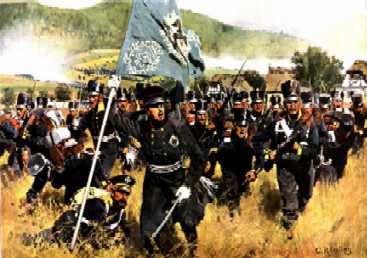
Prussia

Prussian Infantry at Kulm, 1813.
Introduction
Because of the 18th Century successes of Frederick the Great, the Prussian army began the Napoleonic wars with a formidable reputation. However, this reputation was shattered in 1806 by Napoleon's "blitzkrieg" defeat of Prussia following the spectacular French victories at the battles of Jena and Auerstädt.
It was widely accepted that the Prussians were defeated because they clung to outdated tactics. However, recent research showing that the Prussian army of 1806 was well-trained in the tactics of the day has cast doubt on the earlier conclusion. Prussia's 1806 defeat is now blamed on the Prussian High Command. The lack of a proper command structure resulted in petty bickering among Prussian commanders over the strategy to be adopted against Napoleon. Thus, although Prussia mobilised much earlier than the French, Prussian troops were widely scattered when Napoleon struck.
This humiliating defeat caused Prussia to completely overhaul its army and command structures. The result was the well-officered and competent army which played a major role in defeating Napoleon twice - during the "Wars of Liberation" in 1813-14 and at Waterloo.
Artillery
[an error occurred while processing this directive]